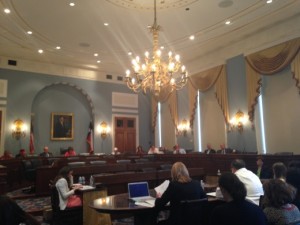Imagine your congregation without a food shelf. Imagine it without regular food drives. Imagine it without free community meals.
At first, it might make you nostalgic for the afternoons you’ve spent packing grocery bags for the pantry with your fellow congregants, or maybe sad for the loss of evenings spent chatting with those who show up for a free supper. But looking beyond those memories, you’ll see a community, a state, or maybe – dare we dream it – an entire nation where no one is hungry. While testifying before Congress, Sherri Tussler from the Hunger Task Force in Milwaukee, Wisconsin explained why we should dream of a day when these ministries are gone – “The day we don’t need food banks is the day we end hunger in America.”
According to the United States Department of Agriculture, in 2013 (most recent data available), 17.5 million households faced food insecurity at some point during the year. Living in those homes are 15.8 million children failing to receive consistent, quality nutrition. You know these children. You see them walking into the school when you drop your own children off. You watch them play football at the high school on Friday nights. You share in communion with them on Sundays.
So how do we put food banks out of business? Churches are often hubs where families can go to receive assistance, whether its bags stocked with groceries, free meals throughout the week, or through some other hunger-based ministry. The ways that congregations reach out in their communities to provide food for those in need are incredible examples of how people of faith live out God’s call to love one another. However, congregations can’t end hunger on their own. Bread for the World reported that one in 20 bags of food assistance comes from a charitable organization – the rest comes from Federal nutrition programs.
These Federal nutrition programs are incredibly important. While we do the best we can as churches and communities to combat hunger and provide food for our neighbors, we still face need beyond our capacities. As we continue to care for our communities, it’s also important for us to ask Congress to support policies that provide ample assistance for our nation’s hungry children. Funding for important child nutrition programs will run out unless Congress reauthorizes them. Visit the ELCA Advocacy Action Center and call on Congress to:
- increase funding for child nutrition programs like Supplemental Nutrition Program for Women, Infants and Children, the National School Lunch Program, and the Summer Food Service Program;
- invest in expanding access to these programs in rural and Native American communities;
- continue supporting the use of these programs to access nutritious foods as determined by scientific recommendations;
- and address climate change, as it contributes heavily to the rising cost of nutritious food.
Imagine your congregation without a food shelf, food drives, or free community meals. Reauthorizing child nutrition programs brings us one step closer.

